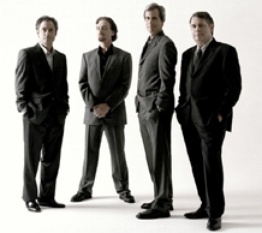Concert Review: The Emerson String Quartet — A Note of Sadness
The Emerson String Quartet gave its all—beauty, power, fire—in Johannes Brahms’s String Quartet in A minor, Opus 51, no. 2.
By Susan Miron
Classical music’s Fab Four, the sublime Emerson String Quartet, made their 20th visit to the Celebrity Series of Boston on Sunday. Any visit from the Emersons is a gift: they have had a historic run as, arguably, the best all-around string quartet in the world since shortly after their inception 35 years ago.
For many, their Sunday concert was tinged with sadness because its cellist David Finckel is leaving the quartet (which has never had a personnel change) to pursue his myriad, extra-quartet interests, mostly with his pianist-wife Wu Han. The Emerson Quartet’s program, made up of three historically interconnected Romantic quartets, seemed pretty run-of-the-mill for such an occasion, but apparently this is how the quartet wanted it to be. The small print at the bottom of the program informed us of the following:
At the end of the current season, cellist David Finckel will leave the Emerson Quartet to pursue his increasingly diversified careers as soloist, educator, and administrator. Though this may feel like the end of an era, we welcome his illustrious successor, Paul Watkins, who joins the Quartet in May of 2013. David enthusiastically supports the future of the ensemble that he worked so hard to build and sustain for more than three decades.
The quartet—violinists Eugene Drucker and Philip Setzer, violist Lawrence Dutton, cellist David Finckel—was in its usual extraordinarily fine form for the occassion. Each solo was played with elegance – unisons and duets completely in tune, particularly in the performance of the rarely-performed String Quartet No. 9 in D minor, Op 34 (there are 15, four of which were unpublished in his lifetime). Eugene Drucker played first violin in the Dvorák; Philip Setzer played second violin. They switched for the next two quartets, as they—uniquely—have always done, with extraordinary success.
What’s unusual about this quartet is that the scherzo movement is a polka rather than Dvorák’s more usual dumka or a furiant. Its luscious, slow movement features double stops that often produce six part harmony from the four instruments. Dvorák dedicated this quartet (written in 1878) to his mentor and friend Johannes Brahms; the four string players expertly and lovingly passed lines as if from one dear friend to another. Admittedly, it’s not an outstanding Dvorák composition, such as the American Quartet or the E flat Quartet, but it (unsurprisingly) received a excellent performance, making a good case for another hearing.
For this listener, Robert Schumann’s String Quartet in A major, Opus 41, no. 3 shares some of the awkwardness of his other compositions without piano. It was one of three string quartets he composed in six weeks. Give Schumann a piano, and you get many of the large-scale gems (made up of little jewels) of the piano literature: the Piano Quintet, the Piano Quartet, the Piano Trio, the beloved Piano Concerto in A minor, and a good portion of the Romantic song literature. But remove the piano as an anchor (he composed at home at the piano) and Schumann—pace those who admire the four symphonies—did not do his most inspired work. Of unusual interest in this quartet is the rare use of the variation form in the scherzo movement. The Emersons deftly played the allegro molto vivace last movement with drama and excitement, making a strong case for this quartet.
Finally, the Emersons gave their all—beauty, power, fire—in Johannes Brahms’s String Quartet in A minor, Opus 51, no. 2. Brahms famously worshipped Schumann (no one is positive if there was an actual love affair away from the keyboard between Brahms and Clara Schumann, Robert’s wife, the illustrious pianist). Brahms, when young, showed his music to Schumann just as Dvorak showed his music to Brahms. Scattered throughout the quartet are important interchanges between the violins and viola, all played seamlessly, with precision and an uncanny unity of sound. The cello and viola contain numerous gorgeous solos, each and every one projected beautifully.
The Emerson Quartet remains the refined musical powerhouse it was from the start. These are four uniquely matched musical personalities whose sound blends in the most delicious way. Following the trajectory of the quartet’s career has been a great pleasure, and I wish it continued successes with its new cellist.
For those already suffering David Finckel withdrawal, there is a wealth footage of him teaching cello on You Tube (Cello Talks), and playing, mostly with his wife, Wu Han. Try to catch their YouTube concert at Union College; the moving encore (“Vocalise” by Rachmaninov) is found on YouTube.
He and Wu Han also run and record for ARTIST LED recordings.
David Finckel and Wu Han will be playing at Concord Chamber Music Society on Sunday, March 24.
Tagged: David Finckel, The Celebrity Series of Boston, the Emerson String Quartet



